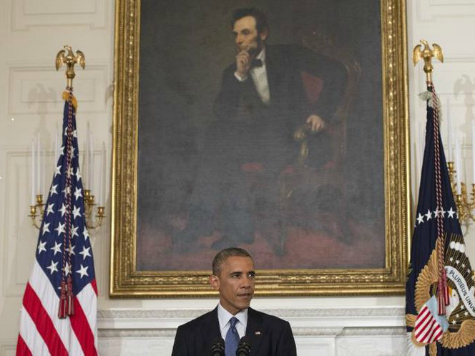Last week, House Minority Leader Nancy Pelosi compared President Barack Obama’s declaration of executive amnesty for millions of illegal aliens to President Abraham Lincoln’s Emancipation Proclamation during the Civil War. In a Los Angeles Times op-ed, Yale constitutional scholar Bruce Ackerman does the same. Just as Lincoln freed the slaves but left many questions open, Ackerman argues, Obama’s amnesty will “initiate” further debate.
The comparison flatters Democrats, who also likened Obamacare to the civil rights struggle, casting opponents as Southern segregationists. Though Obama himself said dozens of times that he could not use his executive powers in the way he has just done, Ackerman tries to distinguish Obama’s immigration orders from other executive actions he has already taken, such as waging war against ISIS (“the imperial presidency at its worst”).
Ackerman’s analogy, however, is not just flawed, but outrageous.
First of all, Obama’s executive order applies to individuals who have broken the law of their own free will (with the possible exception of those brought to the U.S. illegally as children, though many of those may have likely broken other laws to stay in the U.S.). Lincoln’s proclamation applied to slaves in Confederate states, who were legal Americans (despite the Dred Scott case), not foreigners.
Second, it was clear by the time that Lincoln issued the Emancipation Proclamation on Jan. 1, 1863 that only war would free the slaves. In contrast, there are legislative avenues to resolving the problem of millions of illegal aliens on American soil. President Obama complains that Congress has “failed to act”–but in fact he threatened to veto any congressional legislation that did not comport with his own, politically-motivated conditions.
Third, Ackerman claims that Obama’s action is “democracy-forcing,” pushing both Democrats and Republicans to consider an immigration issue that they might otherwise avoid. Aside from the question of whether it is up to the president to “force” democracy, Ackerman’s reasoning entirely ignores the results of the midterm elections, where the voters presented Republicans with a clear electoral mandate to stop amnesty for illegal aliens.
“Forcing” democracy might be necessary in wartime, but not in peacetime, and not regarding an issue that has no particular urgency to the public. Framing the question as “democracy-forcing” likely promotes Ackerman’s own policy preferences, since even partial amnesty for illegals, once implemented, will be politically impossible to remove. It forces debate in a particular direction, rather than opening up debate, as Ackerman argues.
Indeed, what is most offensive about comparing executive amnesty to the Emancipation Proclamation is that doing so forecloses the possibility of reasoned debate by casting opponents–who represented a plurality of Americans in polls before Obama’s announcement–as supporters of slavery. In effect, Ackerman relieves Democrats of the responsibility to explain how Obama’s action comports with the Constitution or public policy.
The Emancipation Proclamation analogy also flatters Obama, inappropriately, by comparing him to one of the greatest American presidents. If Ackerman were really as concerned about the abuse of executive power as he purports to be, he would be less eager to bolster the self-regard of a peculiarly narcissistic president, who has indicated that he sees executive orders not as rare exceptions but as the heart of his second-term agenda.
Senior Editor-at-Large Joel B. Pollak edits Breitbart California and is the author of the new ebook, Wacko Birds: The Fall (and Rise) of the Tea Party, available for Amazon Kindle.
Follow Joel on Twitter: @joelpollak

COMMENTS
Please let us know if you're having issues with commenting.